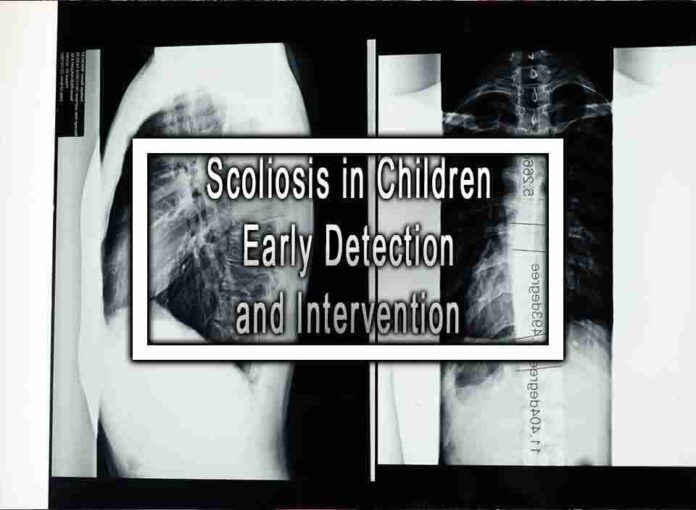Scoliosis is a condition characterized by an abnormal sideways curvature of the spine. Detecting and addressing scoliosis in children early is important to prevent the condition from worsening and to provide appropriate interventions. Here are some key points about scoliosis detection and intervention in children:
1. Screening:
- Schools often conduct scoliosis screenings, but parents and caregivers should also regularly observe a child’s posture and back for signs of asymmetry, uneven shoulders, or protruding ribs.

2. Risk Factors:
- Genetics play a role in scoliosis. If there’s a family history of scoliosis, children should be monitored more closely.
3. Pediatrician Visits:
- Regular visits to the pediatrician can help with early detection. Doctors may perform the Adam’s Forward Bend Test, where the child bends forward while the doctor checks for any noticeable spinal abnormalities.
4. Specialist Evaluation:
- If scoliosis is suspected, a referral to a pediatric orthopedist or spine specialist is recommended for a thorough evaluation.
5. X-rays and Imaging:
- In some cases, X-rays or other imaging tests may be necessary to determine the severity and progression of scoliosis.
6. Monitoring Growth:
- Children are at higher risk of scoliosis progression during growth spurts. Regular monitoring during growth phases is crucial.
7. Non-Surgical Interventions:
- Mild cases of scoliosis are often managed through a combination of targeted exercises, bracing, and physical therapy designed to support spinal alignment and slow progression. For individuals seeking specialised care, options such as Scoliosis Physical Therapy Denver or similar services elsewhere can provide personalised treatment plans focused on strength, posture, and long-term spinal health.
8. Brace Treatment:
- Bracing is recommended for moderate cases of scoliosis when the curvature is still flexible and the child is growing. Braces help prevent further curvature progression.
9. Surgical Intervention:
- Severe cases of scoliosis may require surgical intervention, especially if the curvature continues to progress despite non-surgical treatments.
10. Psychological Support:
Children with scoliosis may experience emotional and self-esteem challenges due to physical changes. Psychological support is important for their well-being.
Early detection and intervention are key to managing scoliosis effectively. If scoliosis is detected in your child, consult a medical professional specializing in spine health to determine the best course of action for your child’s specific situation.











